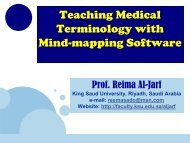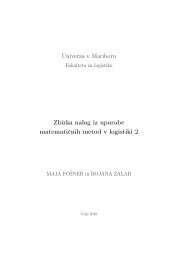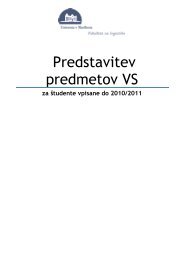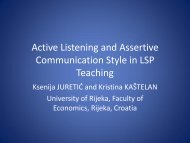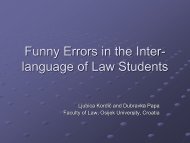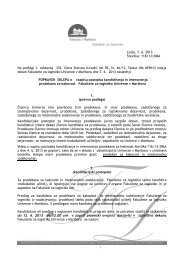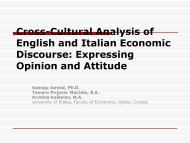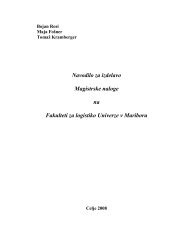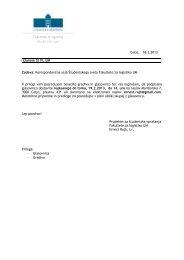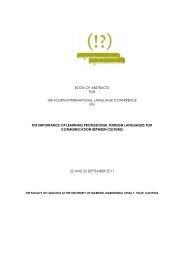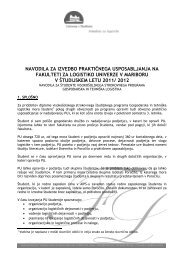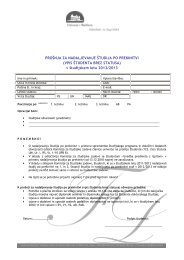Subject specification - Fakulteta za logistiko - Univerza v Mariboru
Subject specification - Fakulteta za logistiko - Univerza v Mariboru
Subject specification - Fakulteta za logistiko - Univerza v Mariboru
You also want an ePaper? Increase the reach of your titles
YUMPU automatically turns print PDFs into web optimized ePapers that Google loves.
Trček, D.: Informatika – Od tehnologije do poslovanja, VŠM, 2001, ISBN: 961-6268-52-X COBISS.SI-ID:<br />
110445312.<br />
Vidmar, T.:Informacijsko-komunikacijski sistem, Ljubljana, Pasadena, 2002 , ISBN: 961-6361-24-4,<br />
COBISS.SI-ID: 24217349.<br />
Cilji:<br />
• Študenti bodo:<br />
• spoznali osnove sodobnih informacijskih<br />
tehnologij: temeljne principe delovanja<br />
sodobnih računalnikov in računalniških<br />
omreţij,<br />
• spoznali temeljne koncepte računalniško<br />
podprtih logističnih informacijskih sistemov,<br />
• spoznali koncepte načrtovanja podatkovnih<br />
baz temelječih na relacijskem<br />
podatkovnem modelu,<br />
• spoznali koncepte načrtovanja in vodenja<br />
projektov s pomočjo informacijske<br />
tehnologije.<br />
Predvideni študijski rezultati:<br />
• Znanje in razumevanje:<br />
• študenti razumejo osnovne koncepte in<br />
zgradbo računalniško podprtih<br />
informacijskih sistemov - zlasti logističnih.<br />
• Prenesljive/ključne spretnosti in drugi<br />
atributi:<br />
• študenti so sposobni sodelovanja pri<br />
načrtovanju in uvajanju logističnih<br />
informacijskih sistemov ter vodenja<br />
projektov ob podpori informacijske<br />
tehnologije.<br />
Metode poučevanja in učenja:<br />
Predavanja:<br />
pri predavanjih študent spozna teoretične vsebine<br />
predmeta. Del predavanj se izvaja na klasični<br />
način v predavalnici, del pa v obliki e-predavanj<br />
(e-predavanja se lahko izvajajo na<br />
videokonferenčni način ali s pomočjo posebej v ta<br />
namen didaktično pripravljenih e-gradiv v<br />
virtualnem elektronskem učnem okolju).<br />
Vaje: Število študentov pri vajah mora biti<br />
prilagojeno modernim učnim in izobraţevalnim<br />
metodam.<br />
Del vaj se izvaja na klasični način v predavalnici,<br />
del pa v obliki e-predavanj (e-vaje se lahko<br />
izvajajo na videokonferenčni način ali s pomočjo<br />
posebej v ta namen didaktično pripravljenih e-<br />
gradiv v virtualnem elektronskem učnem okolju).<br />
Objectives:<br />
• • Students will:<br />
• get to know the fundamentals of<br />
contemporary information technologies:<br />
fundamental paradigms of contemporary<br />
computer (networks) operation,<br />
• get to know the key concepts of ICTsupported<br />
logistic information systems,<br />
• gain conceptual knowledge in the field of<br />
relational database design,<br />
• gain conceptual knowledge in the field of<br />
ICT-supported project planning.<br />
Intended learning outcome:<br />
• • Knowledge and Understanding:<br />
• the students develop a grasp on the key<br />
concepts and structure of computerized<br />
information systems – especially for logistic<br />
environments.<br />
• • Transferable/Key Skills and other attributes:<br />
• the students are able to cooperate in design<br />
and introduction of logistic information<br />
systems as well as in ICT-supported project<br />
management.<br />
Learning and teaching methods:<br />
Lectures: students understand the theoretical<br />
frameworks of the course. Part of the lecture<br />
course is in a classroom while the rest is in the<br />
form of e-learning (e-lectures may be given via<br />
video-conferencing or with the help of specially<br />
designed e-material in a virtual electronic learning<br />
environment)<br />
Tutorials: Students enhance their theoretical<br />
knowledge and are able to apply it. Part of the<br />
seminar is in a classroom while the rest is in the<br />
form of e-learning (e-seminars may be given via<br />
video-conferencing or with the help of specially<br />
designed e-material in a virtual electronic learning<br />
environment).<br />
Načini ocenjevanja:<br />
• domače naloge,<br />
• seminarska naloga,<br />
• pisni izpit.<br />
Deleţ (v %) /<br />
Weight (in %)<br />
• 25 %<br />
• 25 %<br />
• 50 %<br />
Assessment:<br />
• seminar work,<br />
• project,<br />
• written exam.



